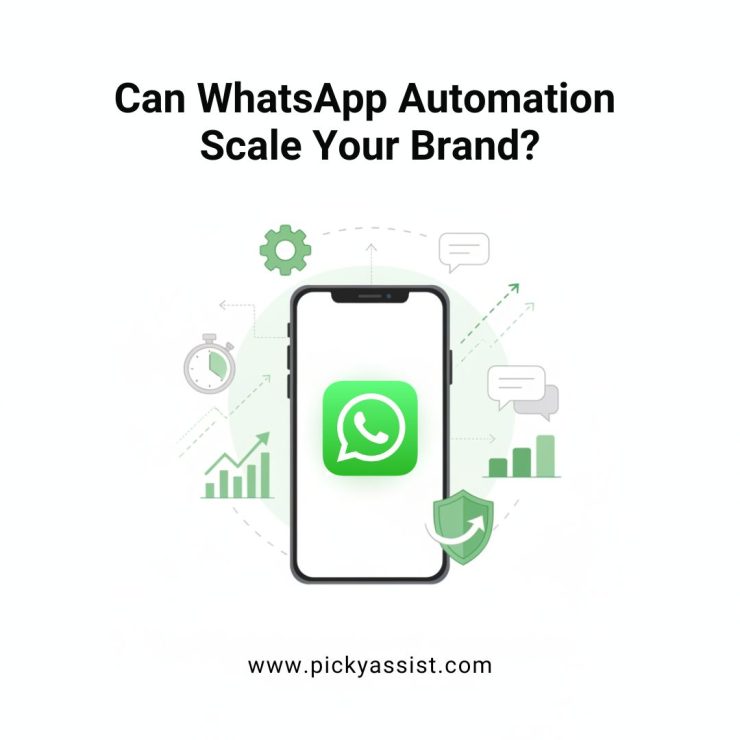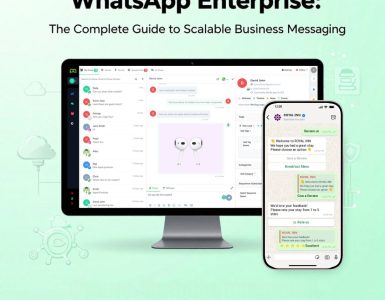Over the past few years, WhatsApp has quietly become the backbone of modern business communication. Brands of all sizes, from local retailers to fast-growing startups, have shifted from traditional channels to conversational messaging simply because customers respond faster and remain more engaged. Naturally, this has sparked growing interest in whether free WhatsApp automation for business can genuinely support long-term brand scale.
The idea of setting up automation without paying feels attractive, especially for teams optimizing early costs. And with platforms now offering free plans, including the Free Forever Plan from Picky Assist, many businesses are curious whether this “no-cost” setup can carry them beyond the startup stage. But as more companies build customer journeys on WhatsApp, the deeper question remains: how far can free automation really take you?
Automation today includes everything from simple away messages to smart workflows powered by a WhatsApp automated bot capable of answering customer questions instantly. Even basic follow-ups, reminders, and alerts rely on automated messages on WhatsApp Business to ensure no opportunity slips through. Free tools provide these essential building blocks, making them appealing in the early phases. But at some point, every growing business faces a ceiling.
What Free WhatsApp Automation for Businesses Can Really Do?
For businesses just starting their digital communication journey, free WhatsApp automation for business can feel transformative. It helps set up essential systems without financial risk. Most free tools, including free plans offered by platforms like Picky Assist, provide features such as quick replies, away messages, message scheduling, and basic workflows.
Small teams often rely on simple auto-messages triggered when a new inquiry arrives or when someone signs up through a form. These foundational capabilities also make it easy to begin experimenting with WhatsApp marketing automation, especially for notifications, reminders, or simple nurturing sequences.
A lightweight WhatsApp automated bot can reduce repetitive workload and provide predictable responses. For low message volumes and straightforward customer journeys, these tools are more than sufficient. The ability to automate without paying, even while maintaining professional responsiveness, makes free solutions extremely attractive.
But this comfort lasts only while message volume, complexity, and the need for personalization remain low.
The Hidden Limitations When You Begin to Scale
The real test begins once your business starts growing. As conversations multiply, the limitations of free tools become far more visible.
Growing brands need:
- Multi-step workflows
- Event-based triggers
- Real-time personalization
- CRM and system integrations
- Multi-agent support
- Segmentation and analytics
Basic automation cannot handle this depth.
This is where the WhatsApp automation API becomes essential. Free tools typically do not support the complexity required for API-driven automation, especially when you need dynamic triggers, CRM-level data processing, or advanced WhatsApp API automation.
Support teams eventually require shared inboxes, routing rules, tags, or context-aware responses. Marketing teams need segmentation and performance analytics to run effective marketing automation WhatsApp campaigns. As customer expectations rise, free tools struggle to keep up with quality and consistency.
Even if you begin with free WhatsApp automation for business, scaling forces you to upgrade if you want predictable, friction-free communication.
How free WhatsApp automation for business creates an edge?
Free automation platforms, especially those that also offer a free plan like Picky Assist, step in with capabilities specifically designed for scaling.
Many growing brands use systems like Picky Assist to automate qualification flows, assign tags, score leads, and send personalized follow-ups using advanced WhatsApp automation marketing features. Businesses running promotional or transactional campaigns rely on structured automation and event-based triggers.
Support teams benefit from AI-powered bots that answer queries and route users intelligently. Developers rely on the WhatsApp automation API to integrate internal systems and automate workflows such as appointment updates, reminders, service tickets, or renewals.
For long-term scale, businesses need sophisticated WhatsApp Business automation journeys, onboarding sequences, abandoned cart messages, subscription renewals, and NPS surveys. Free tools rarely offer the depth required to handle these at scale, while platforms like Picky Assist provide both flexibility and stability.
Is the Free Version Enough?
A startup, small business, or solopreneur can comfortably get started with free WhatsApp automation for business. It builds a strong foundation, helps create consistency, and reduces manual work. But as the business grows, conversations multiply, and customer journeys expand, free tools hit their limits.
Scaling requires deeper automation, AI-driven replies, API-based workflows, segmentation, multi-agent routing, data syncing, analytics, and advanced triggers. Platforms like Picky Assist are designed for that next stage, enabling predictable, automated, large-scale WhatsApp operations that free tools simply cannot match.
If the goal is true scaling, smoother operations, higher conversions, faster responses, and richer customer journeys, then moving beyond free automation isn’t optional; it’s inevitable.
FAQs on Free WhatsApp Automation for Business
Is free WhatsApp automation enough for growing businesses?
For small brands with low message volume and simple workflows, the basic features of free WhatsApp automation for business are usually enough. But as the business grows, limitations around workflows, routing, API access, and analytics make an upgrade necessary, something platforms like Picky Assist make easy through seamless scaling options.
What makes advanced WhatsApp automation different?
Basic tools provide simple automated messages and quick replies. Advanced automation uses segmentation, AI-driven responses, CRM syncing, and workflow logic. Platforms such as Picky Assist enhance automation with personalization and data-driven triggers.
How can WhatsApp Business be automated effectively?
You can begin with built-in automation on WhatsApp Business, but scaling requires deeper integration using WhatsApp business API automation. Solutions like Picky Assist allow businesses to build intelligent, event-based WhatsApp workflows.
Does WhatsApp automation impact conversions?
Absolutely. Businesses using WhatsApp for business automation commonly experience conversion increases between 25%–40% due to personalized, real-time engagement. Tools like Picky Assist amplify these results with structured workflows.







Add comment